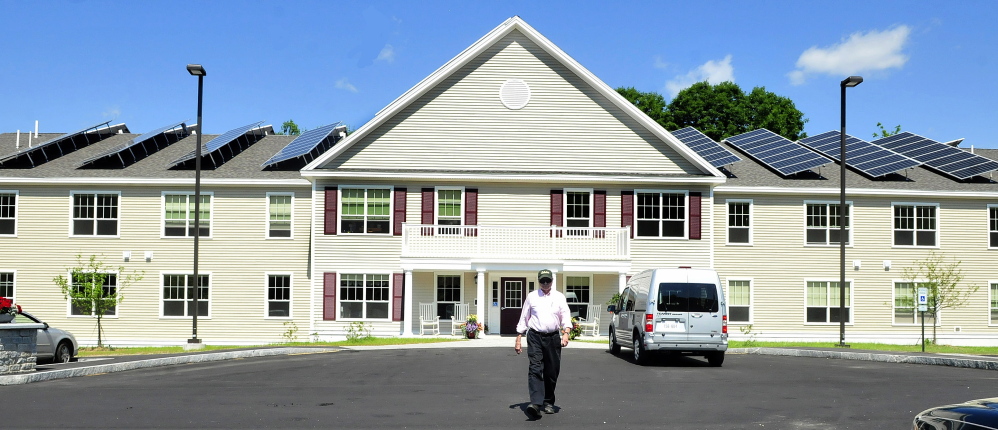Gov. Paul LePage and the Democratic leaders in the Legislature rarely find room for compromise when they disagree. Even when they largely see eye-to-eye on an issue, it doesn’t get much better.
That’s why it’s encouraging to hear LePage, whose most prominent negotiating tool is often the veto pen, come out immediately in support of a series of initiatives proposed last week by one of the frequent targets of the governor’s derision, House Speaker Mark Eves.
There’s a lot to like in Eves’ proposed bills, which are aimed at helping Maine seniors stay in their homes and communities longer.
That’s especially true for the parties courting votes from seniors and their children, who are often in charge of finding care and housing for their aging parents.
The question, though, is whether the proposals can survive the politics and personal acrimony that defined the last legislative session, and are likely to return if LePage wins re-election in November. The answer depends largely on the governor himself.
LEPAGE ‘ALL IN’
Eves’ plan, unveiled Wednesday at a senior housing facility in Brunswick, calls for a $65 million bond to fund the construction of 1,000 units of efficient, affordable senior housing. It also would increase property tax credits for older Mainers and raise the Medicaid reimbursement rates for the workers who provide in-home care for seniors.
The plan, called the KeepME Home initiative, is the result of a series of forums on aging hosted in the last year by Eves, who is also running for re-election.
The three bills announced last week are just a start, said Eves, who plans to build a bipartisan “aging caucus” in the Legislature to promote actions coming out of the initiative.
That quest for bipartisanship got an unexpected boost on Thursday. LePage – who just last month criticized Democrats about another senior issue, funding for nursing homes – called into a WVOM radio talk show to give his tentative support to Eves’ initiatives.
“I’m all in on that,” LePage told the show’s hosts, George Hale and Ric Tyler. “I’m ready and waiting.”
AGING STATE
There’s a reason both parties are quick to embrace this issue. Maine has the highest median age of any state, and it is second only to Florida in proportion of residents older than 65. Of Maine’s 1.3 million residents, 29 percent are baby boomers, who are turning 65 at a rate of 18,250 per year. By 2030, Maine will have twice as many residents older than 85 than it does now.
The state’s demographics, along with its hefty property tax burden and aging housing stock, have put senior housing in heavy demand. According to the Maine State Housing Authority, Maine needs about 8,000 units of senior housing by 2015. Creekside Village, where Eves made his announcement last week, has a waiting list 140 people long, an issue it shares with housing centers across the state.
The $65 million bond is aimed directly at paring down those waiting lists. The 1,000 units would be spread through 40 communities, allowing residents who can no longer afford to heat and pay taxes on their homes to stay nearby. The other two measures – raising the Property Tax Fairness Credit and increasing pay for in-home care – would help keep seniors in their homes, and in the some cases, out of nursing homes.
That’s good for Maine seniors and their families, as well as taxpayers, who often pick up the significant costs of nursing homes through Medicaid.
BACK TO BICKERING?
Just because these measures make sense doesn’t mean they’re a shoo-in next legislative session. The spat over nursing home funding, for instance, shows how partisanship, particularly in the hands of LePage, can threaten to sink even the best of intentions.
In that case, LePage never really worked with the Legislature toward a solution, content to veto one bill and then offer another of his own, at the last minute and with a demand that it not be altered.
The governor spent much of the early summer criticizing Democrats for failing to follow his orders and call a special session to address the funding, even though the governor could have called the session himself.
Then, with the Democrats attempting to negotiate with the governor, LePage announced that he would increase nursing home reimbursements using budget surplus funds.
It was certainly a political win for the governor, who was able to claim the issue for himself, even though lawmakers had previously approved – over LePage’s veto – more than $20 million for nursing homes. That kind of obfuscation may win votes, but it also can delay and derail good legislation.
LePage’s initial reaction to Eves’ plan, then, bodes well for its future. If the governor is re-elected and Eves’ package of bills reaches his desk sometime next year, let’s hope he remembers this midsummer burst of bipartisanship.
Send questions/comments to the editors.



Success. Please wait for the page to reload. If the page does not reload within 5 seconds, please refresh the page.
Enter your email and password to access comments.
Hi, to comment on stories you must . This profile is in addition to your subscription and website login.
Already have a commenting profile? .
Invalid username/password.
Please check your email to confirm and complete your registration.
Only subscribers are eligible to post comments. Please subscribe or login first for digital access. Here’s why.
Use the form below to reset your password. When you've submitted your account email, we will send an email with a reset code.